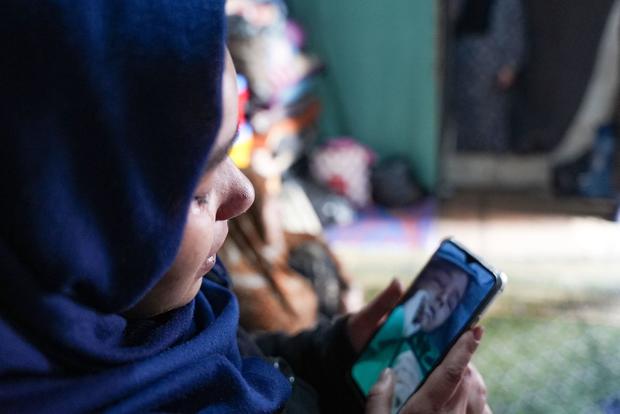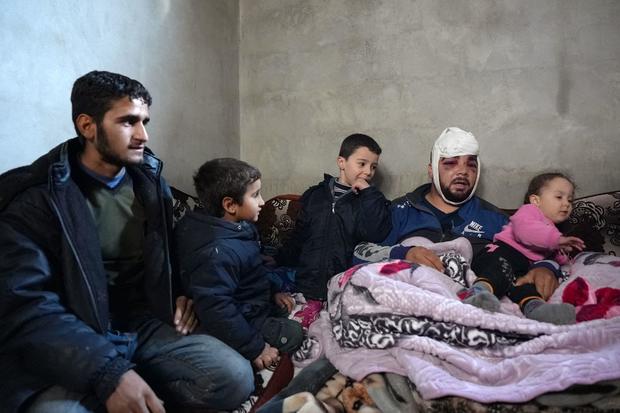Deir Ballut, Syria — Widowed and homeless, Duaa Ghadban lost everything in a powerful earthquake, forcing her to take shelter in a camp for people displaced by war in Syria’s northwest. The 7.8-magnitude quake early Monday has killed more than 19,700 people in Turkey and Syria and flattened entire blocks over residents in their sleep.
CBS News correspondent Chris Livesay reported Thursday from in front of one of those razed buildings — a six-story block that was home to 24 families — all reduced to crumbled concrete and twisted steel.
Two bodies were pulled out of the debris while our team was there, and there was another visible in the rubble. Rescuers said a teenage girl was still alive under the slabs of concrete. She managed to text a friend to let people know she was trapped.
Emrah Gurel/AP
The earthquake killed Abdulaim Muaini’s wife and buried him alive. For 72 hours he fended off exposure, hypothermia, and unimaginable grief, knowing that his wife hadn’t survived.
There has been unseasonable cold, with temperatures as much as 15 degrees lower than normal. The World Health Organization says the conditions are making the catastrophe even more lethal.
“We’ve got a lot of people who have survived now out in the open and in worsening and horrific conditions,” said WHO earthquake response incident manager Robert Holden “We’ve got major disruption to basic water supplies. We’ve got major disruption to fuel, electricity supplies, communication supplies — the basics of life. We are in real danger of seeing a secondary disaster which may cause harm to more people than the initial disaster.”
International search and rescue teams and relief supplies have started pouring in, including two teams from the U.S.
U.S. Ambassador to Turkey Jeff Flake told CBS News that a couple American Blackhawk helicopters were flying missions to rescue people from the quake zone.
“The assets they have — the machinery, you know, to cut through concrete, rebar, and the dogs as well, to try to find those survivors still there,” said Flake. “You know — when we respond, we do it well.”
And the first aid convoy crossed into Syria from Turkey on Thursday, with United Nations Secretary-General Antonia Guterres telling reporters in New York that “it included six trucks carrying shelter and other desperately needed relief supplies.”
Asked by CBS News correspondent Pamela Falk whether the U.N. was disappointed by delays in getting aide into Syria following the quakes, Guterres said: “We all struggle to do our best.”
The help is coming too late for thousands of people still desperate to see their loved ones extracted from crumbled buildings on both sides of the Turkey-Syria border.
“My mother, father and brother are under the rubble,” cried 34-year-old survivor Selen Ekimen. “There’s been no sound from them for days. None.”
Syrians displaced by the country’s 12-year war, living in tents along the Turkish border, were largely spared the damage. That includes Ghadban, 21, who was pulled out of the wreckage hours after the quake and now lives in a relative’s shoddy shelter in the Deir Ballut camp in northwest Syria.
The dazed mother stared at a photo of one of her deceased children on her phone, weeping as she kissed the screen.
She saw her husband’s dead body trapped under concrete slabs, as he was embracing one of her three children — all of whom are now dead, she said.
RAMI AL SAYED/AFP/Getty
“They buried them together. My husband never let him go,” Ghadban said, barefoot in the winter cold, her voice breaking as she recalled the tragedy that killed her 40-day-old toddler. “I still can’t believe I made it out, I feel like I’m still stuck under the rubble.”
She is now crammed into one room with her mother, sister, brother and their families.
“We have nothing left,” she said.
Many survivors like Ghadban flocked to camps including Deir Ballut, either because they had nowhere to sleep or because they feared aftershocks would level their damaged homes.
Displaced camp dweller Fida Mohammed told AFP the residents there “thanked God for their tents after they saw what happened.”
After disaster struck, Ghayath Zarzour moved to the camp to live with his two displaced cousins and their families.
RAMI AL SAYED/AFP/Getty
“We are 30 people in this small room, without heating or blankets,” he said, his head wrapped in a white gauze and eyes swollen shut.
Already displaced from Damascus by war, Zarzour now lost his second home in the northern town of Jandairis.
“We have been displaced time and time again,” he said, huddled under the same blanket with his children. “Today, history repeats itself.”
Stay connected with us on social media platform for instant update click here to join our Twitter, & Facebook
We are now on Telegram. Click here to join our channel (@TechiUpdate) and stay updated with the latest Technology headlines.
For all the latest Education News Click Here



